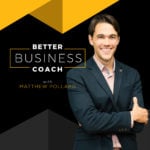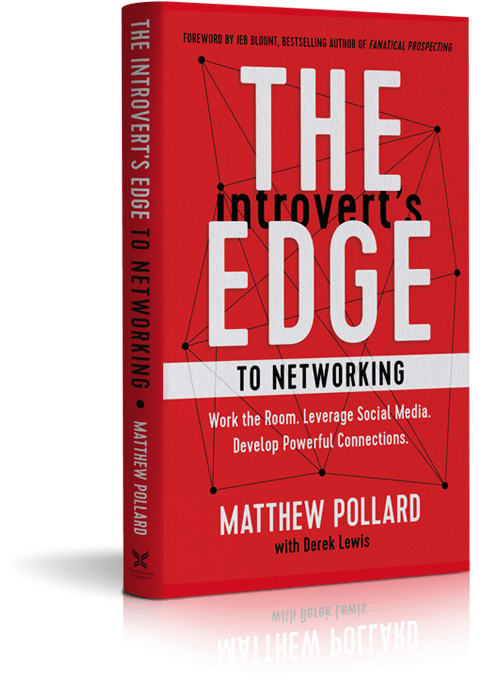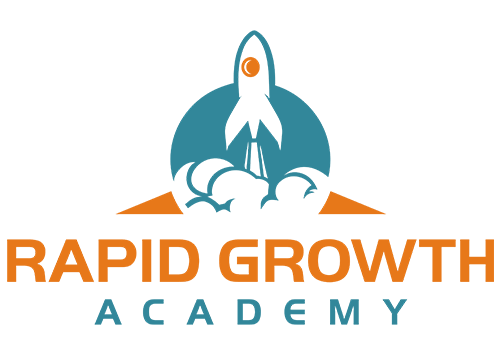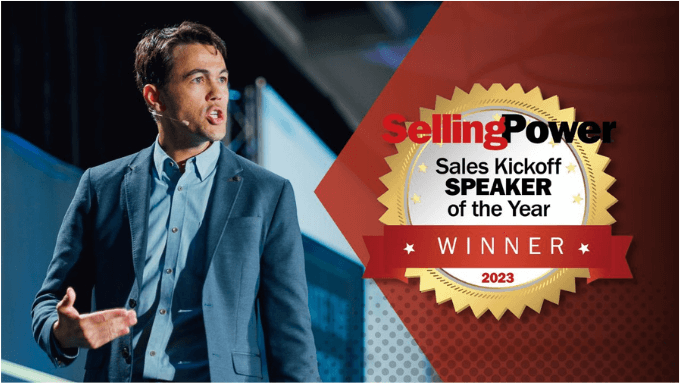In our drastically altered, post-Covid business landscape, the role of a truly effective sales speaker has moved way beyond routine presentations on old-school sales tactics. Today’s leading sales speakers are catalysts for change, equipped to inspire teams, introduce fresh perspectives, and guide strategies that align with the shifting needs and desires of international sales and global markets in a digital-first world.
The sales speakers who can make a real difference these days are seasoned professionals who bring a wealth of practical experience, innovative ideas, and a deep understanding of sales intricacies including niche marketing, systemization, client engagement and retention, effective networking, the art of prospecting, storytelling, and much more.
For meeting planners on the lookout for their next keynote speaker, the challenge lies in discerning the truly transformative sales speakers from those still stuck in yesterday’s mindset. By the end of this article, you’ll understand exactly what to look for in a sales motivational speaker, and the red flags that should cause you to run for the hills. Get ready to make your next event a huge success!
What Today’s Sales Professionals Need in a Keynote Speaker
In the recent past, traditional sales speakers often centered their presentations around motivational tactics, tried-and-true sales methodologies, and success stories aimed at boosting morale and driving teams to embrace proven sales techniques.
These presentations tended to follow a formulaic approach, emphasizing the importance of persistence, the art of persuasion, and time-testing closing techniques. While all these factors are still and always will be critical components of the sales process, they barely scratch the surface in addressing the major shifts we’ve all undergone in the past few years, such as adapting to rapidly changing markets, technological advancements, and the evolving psychology of buyers.
The Old Ways Just Don’t Cut It Anymore
Today, the landscape demands a new breed of sales speakers who can navigate the complexities of a digital-first world, where sales strategies intertwine with technology, data-driven insights, and a customer-centric approach.
It’s no longer enough for a sales speaker to simply motivate. They must provide actionable strategies that resonate in a market where buyers are more informed, the sales cycle is increasingly virtual, and relationship-building requires navigating digital channels. Old-school sales speakers, with their focus on traditional salesmanship and one-size-fits-all solutions, often fall short in delivering the nuanced guidance needed to thrive in today’s dynamic business environment.
On top of that, the modern sales landscape is riddled with complexities that require a deep understanding of various moving parts. Today’s sales professionals must excel not just in traditional salesmanship but in carving out specific niches, crafting compelling narratives through storytelling, and engaging with clients who, armed with vast amounts of information, often believe they have all the answers.
Sales Speaker or Strategic Advisor?
Navigating this intricate web demands a sales speaker who can dissect and demystify the process of identifying and dominating niche markets, one who can illustrate the power of storytelling in establishing connections and differentiating offerings in a crowded marketplace. They must also be adept at equipping sales teams with strategies to value-add and educate, rather than just sell, to a new breed of well-informed clients.
To complicate matters even further, the art of pricing, packaging, and positioning products or services has become more nuanced in the digital age, where the competition is just a click away, and client loyalty is hard-won. Sales speakers today must address these critical elements, providing insights into creating compelling value propositions that resonate with clients who have endless options.
In essence, the role of a sales speaker has evolved from being a mere motivator to being a strategic advisor, one who can guide sales professionals through the labyrinth of modern sales challenges with agility, insight, and actionable intelligence.
The Innovative Techniques Today’s Sales Teams Need
It’s 2024, and success hinges on a whole lot more than just traditional techniques. This section explores the innovative tactics that modern sales teams need, from the art of storytelling and embracing diverse sales personalities to mastering systemization and simplifying complex jargon. These skills are essential for connecting with today’s informed and discerning customers.
Is your team equipped for the challenges of contemporary selling?
Storytelling
A good story does what a list of features and numbers alone can’t – it captivates, resonates, and sticks with the audience long after the conversation ends. Think of storytelling as painting a picture where your product or service is a key element in a vivid, engaging scene. Of course, the story must be true, and it must feature a customer just like the ones in your niche.
The perfect sales story features the customer as the hero, and leads the listener to want the exact same outcome as the customer in the story. When written, rehearsed, and told the right way, stories short circuit the logical mind, speak directly to the emotional mind, and lead the prospect to think, “I want that!”
In his own keynotes for sales conferences and events, Matthew likes to bring a volunteer from the audience on stage to build and refine a customer story right there in the moment. It’s a critical learning exercise that helps attendees understand each part of the story framework, where to spend the most time, what details to include, what to leave out, and how to deliver it in a way that truly makes your solution and service stand out.
The result? As Jim Brull, Managing Partner for Centroid puts it, “For a group of seasoned corporate salespeople, the idea of using stories in our pitches seemed at first unusual, then intriguing – and when Matt showed us exactly how it’s done, we were floored. Matt has an incredible ability to instantly identify and synthesize exactly what we should tell our prospects, and exactly how to do it most effectively. My best salesperson characterized Matt’s presentation as profound and eye-opening, and I wholeheartedly agree.” (You can see dozens of other speaking testimonials here.)
Drop the Jargon
Closely related to storytelling is the importance of eliminating jargon from a sales discussion, especially for complex, technical products like SaaS (or really product or service that requires a decent amount of customer education).
Many sales motivational speakers don’t even have this concept on their radar. After all, part of the job of a salesperson is to provide the information necessary for their prospect to make an informed decision, right? But trying to sell via jargon-laden features and benefits serves to alienate the prospect, who not only doesn’t understand the technical details, they don’t care! They only care that the product works and, as Harvard Business Review points out, solves their most urgent needs.
So what do you do instead of throwing buzzwords at them? You guessed it – tell a story! Can you immediately see how a detail-rich, captivating story of someone exactly like your prospect would be much for effective than boring technical speak?
Boost the Entire Team
Have you ever had a so-called sales expert come in and offer strategies that really only work for the salespeople already in the top 25%? After all, they’re already the bulldogs and high performers, so a few more tools in their belt will probably work better for them than for anyone else, right?
Believe it or not, virtually ignoring three-quarters of your sales team is pretty much the status quo. According to McKinsey, most organizations have resigned themselves to focusing on their top quartile, expecting that most sales will come from that group – and accepting whatever the bottom 75% happens to produce.
When you really think about it, this is absurd. It’s a stubborn holdover from the old belief that only a certain type of person can succeed at sales – the extroverts. But with introverts making up one-third to one-half of the population, there’s bound to be a good number of them on your sales teams, and the old-school bulldog tactics aren’t going to work for them.
What works instead? Process, systemization, planning, preparation, authenticity, and storytelling.
The best part is, these techniques work for the extroverts too. Imagine the sales transformation that can occur for your organization when your entire team is firing on all cylinders!
Those are the kinds of results you can expect from a sales keynote speaker like Matthew, who builds innovative systems and strategies instead of just accepting things the way they’ve always been.
Red Flags to Watch for in A Sales Keynote Speaker
Now that we’ve touched on what to look for in a speaker, it’s equally important to know what to steer clear of. Let’s look at some of the red flags that can signal a mismatch between a speaker and your sales team’s needs.
Lack of Real-World Experience: If the speaker doesn’t have a substantial background in actual sales or business development, their advice might lack practical applicability. Real-world experience is a non-negotiable for providing insights that are both relevant and actionable.
One-Size-Fits-All Approach: Be wary of speakers who offer generic, one-dimensional sales strategies. Sales today requires a multi-faceted approach; speakers should provide diverse and adaptable strategies tailored to different audiences and market conditions.
Overemphasis on Motivation Over Substance: While motivation is important, it shouldn’t be the entirety of what the speaker offers. The absence of actionable strategies, insights into modern sales techniques, or discussions about digital engagement and customer experience is a significant red flag.
Ignoring Digital and Social Selling: Any speaker who overlooks the importance of digital channels, social media, and online engagement in today’s sales process may not be well-equipped to address current market demands.
Neglecting Diverse Sales Styles and Personalities: If a speaker only focuses on extroverted, aggressive sales tactics and ignores other effective styles, such as consultative selling or the strengths that introverts bring to sales, they may not be suitable for a diverse sales team.
Failure to Provide Case Studies or References: Credible speakers have a history of success and a long list of satisfied clients. Lack of specific examples, case studies, or client references could indicate their strategies haven’t been successfully implemented or tested.
Not Adapting to Current Market Trends: A speaker who doesn’t acknowledge or adapt to current market trends, such as the shift towards customer-centric selling, empathy-driven sales, or the impact of the post-Covid landscape on sales dynamics, might not provide the most relevant insights.
Key Questions to Guide Your Speaker Search
In your search for the ideal sales keynote speaker, ask the kinds of questions that ensure you’re making the right choice. Here are three key questions that can help you gauge whether a potential speaker is the right fit for your needs:
“Can you provide specific examples of how your strategies have been successfully implemented in various industries?” This question helps you assess the speaker’s versatility and the practical applicability of their methods. Is their experience and success limited to just one industry, or do they have a track record of understanding and applying their solutions to varied markets?
“How do you tailor your content and approach to suit different audiences, especially in a post-Covid, digital-first world?” This question will help you understand the speaker’s ability to adapt and customize their approach. Given the diverse nature of sales teams and ever-evolving market dynamics, you’ll want to be sure that the speaker can resonate with a wide range of audiences and is up-to-date with current trends.
“What are your strategies for engaging and training salespeople with varied levels of experience and diverse sales styles?” The answer will reveal the speaker’s understanding of different sales personalities, as well as their competency in providing inclusive and comprehensive training that benefits the entire team, not just the top performers.
These questions will help you uncover the depth of the speaker’s expertise, the adaptability of their methods, and their capacity to provide value to your entire sales team. Always keep in mind that the right speaker should be able to offer clear, actionable insights tailored to your specific challenges and goals.
Finally, consider asking whether your potential speaker holds any certifications or credentials. For example, Matthew is a Certified Speaking Professional, a rigorous certification given to only 12% of speakers worldwide, as well as an eSpeakers Certified Virtual Presenter.
Additional Considerations for Hiring The Perfect Speaker
As New York Times bestselling author and management consultant Max McKeown notes, “Adaptability is about the powerful difference between adapting to cope and adapting to win.”
This quote encapsulates the essence of what it means for a sales team to not just respond to the changing sales landscape but to proactively leverage it for success. How would it make a difference at your next sales event to have a sales motivation speaker who can finally put all the pieces together for your team, propelling them into unparalleled sales success? It’s much more likely to happen if your speaker meets the requirements below.
Fully Understanding Audience Needs, Pain Points, and Goals
It should go without saying that any self-respecting sales speaker will take the time to understand their audience. This is fundamental in order to effectively resonate and connect. And it goes way beyond surface-level demographics; motivational sales speakers must grasp the unique challenges, desires, and drives of their audience in order to deliver the techniques and strategies that move the needle.
You’d be surprised at how many high-dollar speakers don’t bother with this important step, and simply rely on their standard presentation to get the job done. But how much more effective would the keynote speaker be in helping you achieve sales goals if they actually understood what your team needed? This is why Matthew always spends at least one preparatory phone call asking the kinds of probing and insightful questions that help him understand exactly which strategies to present and implement.
Fostering a Strong Company Culture
The impact of a quality speaker should reverberate far beyond their 90 minutes on stage. Keynote speakers can significantly enhance company culture in several ways, such as facilitating important conversations and injecting fresh perspectives and energy into the organization. Their ability to create welcoming and innovative spaces encourages open dialogue among employees about their needs and concerns, helping build trust and transparency.
This kind of speaker can be vital in a company’s culture strategy, often contributing to lower turnover rates and increased growth. They help in fostering an environment where employees feel empowered and secure enough to engage in meaningful discussions and feel confident trying new techniques, thus enriching the overall company culture.
One Speaker, Two Purposes
Many organizations will hire more than one speaker for their event, usually a straightforward motivational speaker as well as one who specializes in sales training. The thinking is that each speaker has their specialty; one for pure amp and motivation, and one for guidance on business trends, global sales, strategies and techniques, and so on.
However, a single person who embodies both motivational and sales expertise offers significant benefits, as a dual approach ensures a unified, comprehensive learning experience for the sales team.
Instead of receiving mixed messages from different speakers, teams benefit from a consistent, integrated approach where motivational insights are seamlessly tied to practical sales techniques. This leads to a deeper understanding and more effective application of sales strategies, fostering a more empowered and strategically equipped sales force.
The Art of Virtual Engagement
With a significant portion of sales interactions now happening online, the ability to engage an audience virtually has become paramount. According to a study by Gartner, by 2025, 80% of B2B sales interactions between suppliers and buyers will occur in digital channels. These virtual sales calls are much different from the face-to-face sales meetings of days gone by.
For example, video calls provide many more opportunities for prospect distraction, making it especially important that the salesperson provide and stick to a scaled-down agenda. It’s also a little trickier to build rapport, partly because of distraction and partly because of missing out on physical cues like mirroring.
Does your sales speaker understand the differences between traditional sales calls and virtual ones? If not, you may be wasting the time and efforts of your sales team.
Conclusion
Sales is about a whole lot more than hackneyed motivational techniques and a few objection-handling strategies. It’s a nuanced and fluid profession with a lot of moving parts, and understanding their interplay can make or break your bottom line.
If you’d like to talk with our team, or with Matthew directly, to understand the true impact a top-tier sales speaker can provide, we’d love to connect!





























